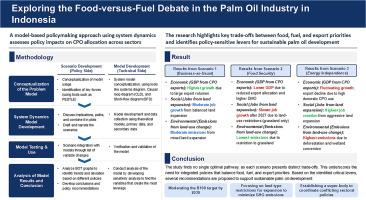探讨印尼棕榈油行业可持续发展的食品与燃料之争:基于模型的政策制定方法
IF 9.5
Q1 ENERGY & FUELS
引用次数: 0
摘要
印度尼西亚是世界上最大的棕榈油生产国,在将其丰富的棕榈油产量分配给各个部门方面面临着挑战。越来越多的生物柴油授权和不断增长的国内消费加剧了食品与燃料的争论,特别是在出口限制、国内市场义务(DMO)和土地扩张战略等政策中。这些重叠的措施引发了利益相关者对其长期可持续性的担忧。因此,我们开展了这项研究,通过基于模型的政策制定方法来研究食物与燃料的困境,使用系统动力学来评估关键的cpo相关政策的经济、社会和环境影响。利用国家数据集、监管文件和利益相关者研讨会的见解,我们模拟了三种政策情景:现状(BAU)、粮食安全和能源独立。结果表明,没有一种方案能够在所有可持续性维度上实现最佳结果。粮食安全途径最能解决食用油需求和减排问题,而能源独立创造的就业机会最多,但会带来更高的环境成本。现状支持GDP增长,但无法满足国内粮食需求。基于这些发现,该研究建议调整B100目标,优先考虑低排放草原的土地转换,并建立一个跨部门的机构来平衡权衡。此外,这项研究有助于制定更平衡和以证据为基础的战略,旨在促进印度尼西亚可持续棕榈油产业的发展。本文章由计算机程序翻译,如有差异,请以英文原文为准。

Exploring the food-versus-fuel debate in Indonesia’s palm oil industry toward sustainability: A model-based policymaking approach
Indonesia, the world's largest palm oil producer, is facing challenges in allocating its abundant palm oil production between various sectors. Rising biodiesel mandates and growing domestic consumption have intensified the food-versus-fuel debate, especially amid policies such as export restrictions, domestic market obligations (DMO), and land expansion strategies. These overlapping measures have sparked concerns among stakeholders regarding their long-term sustainability. Therefore, we develop this study to investigate the food-versus-fuel dilemma through a model-based policymaking approach using system dynamics to assess the economic, social, and environmental impacts of key CPO-related policies. Utilizing national datasets, regulatory documents, and insights from stakeholder workshops, we simulate three policy scenarios: status quo (BAU), food security, and energy independence. Results show that no single scenario delivers optimal outcomes across all sustainability dimensions. The food security path best addresses cooking oil needs and emissions reduction, while energy independence generates the most employment but incurs higher environmental costs. The status quo supports GDP growth but fails to meet domestic food demand. Based on these findings, the study recommends adjusting the B100 target, prioritizing land conversion on low-emission grasslands, and establishing a cross-sectoral body to balance trade-offs. Furthermore, this research contributes to the development of more balanced and evidence-based strategies aimed at advancing a sustainable palm oil industry in Indonesia.
求助全文
通过发布文献求助,成功后即可免费获取论文全文。
去求助
来源期刊

Energy nexus
Energy (General), Ecological Modelling, Renewable Energy, Sustainability and the Environment, Water Science and Technology, Agricultural and Biological Sciences (General)
CiteScore
7.70
自引率
0.00%
发文量
0
审稿时长
109 days
 求助内容:
求助内容: 应助结果提醒方式:
应助结果提醒方式:


